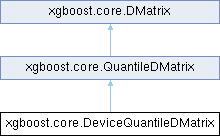Inheritance diagram for xgboost.core.DeviceQuantileDMatrix:

Public Member Functions | |
| None | __init__ (self, *Any args, **Any kwargs) |
 Public Member Functions inherited from xgboost.core.DMatrix Public Member Functions inherited from xgboost.core.DMatrix | |
| None | __del__ (self) |
| None | set_info (self, *Optional[ArrayLike] label=None, Optional[ArrayLike] weight=None, Optional[ArrayLike] base_margin=None, Optional[ArrayLike] group=None, Optional[ArrayLike] qid=None, Optional[ArrayLike] label_lower_bound=None, Optional[ArrayLike] label_upper_bound=None, Optional[FeatureNames] feature_names=None, Optional[FeatureTypes] feature_types=None, Optional[ArrayLike] feature_weights=None) |
| np.ndarray | get_float_info (self, str field) |
| np.ndarray | get_uint_info (self, str field) |
| None | set_float_info (self, str field, ArrayLike data) |
| None | set_float_info_npy2d (self, str field, ArrayLike data) |
| None | set_uint_info (self, str field, ArrayLike data) |
| None | save_binary (self, Union[str, os.PathLike] fname, bool silent=True) |
| None | set_label (self, ArrayLike label) |
| None | set_weight (self, ArrayLike weight) |
| None | set_base_margin (self, ArrayLike margin) |
| None | set_group (self, ArrayLike group) |
| np.ndarray | get_label (self) |
| np.ndarray | get_weight (self) |
| np.ndarray | get_base_margin (self) |
| np.ndarray | get_group (self) |
| scipy.sparse.csr_matrix | get_data (self) |
| Tuple[np.ndarray, np.ndarray] | get_quantile_cut (self) |
| int | num_row (self) |
| int | num_col (self) |
| int | num_nonmissing (self) |
| "DMatrix" | slice (self, Union[List[int], np.ndarray] rindex, bool allow_groups=False) |
| Optional[FeatureNames] | feature_names (self) |
| None | feature_names (self, Optional[FeatureNames] feature_names) |
| Optional[FeatureTypes] | feature_types (self) |
| None | feature_types (self, Optional[FeatureTypes] feature_types) |
Additional Inherited Members | |
 Data Fields inherited from xgboost.core.QuantileDMatrix Data Fields inherited from xgboost.core.QuantileDMatrix | |
| max_bin | |
| missing | |
| nthread | |
| handle | |
 Data Fields inherited from xgboost.core.DMatrix Data Fields inherited from xgboost.core.DMatrix | |
| missing | |
| nthread | |
| silent | |
| handle | |
| feature_names | |
| feature_types | |
 Protected Member Functions inherited from xgboost.core.QuantileDMatrix Protected Member Functions inherited from xgboost.core.QuantileDMatrix | |
| None | _init (self, DataType data, Optional[DMatrix] ref, bool enable_categorical, **Any meta) |
 Protected Member Functions inherited from xgboost.core.DMatrix Protected Member Functions inherited from xgboost.core.DMatrix | |
| None | _init_from_iter (self, DataIter iterator, bool enable_categorical) |
 Protected Attributes inherited from xgboost.core.QuantileDMatrix Protected Attributes inherited from xgboost.core.QuantileDMatrix | |
| _silent | |
Detailed Description
Use `QuantileDMatrix` instead. .. deprecated:: 1.7.0 .. versionadded:: 1.1.0
Constructor & Destructor Documentation
◆ __init__()
| None xgboost.core.DeviceQuantileDMatrix.__init__ | ( | self, | |
| *Any | data, | ||
| **Any | label | ||
| ) |
Parameters
----------
data :
Data source of DMatrix. See :ref:`py-data` for a list of supported input
types.
label :
Label of the training data.
weight :
Weight for each instance.
.. note::
For ranking task, weights are per-group. In ranking task, one weight
is assigned to each group (not each data point). This is because we
only care about the relative ordering of data points within each group,
so it doesn't make sense to assign weights to individual data points.
base_margin :
Base margin used for boosting from existing model.
missing :
Value in the input data which needs to be present as a missing value. If
None, defaults to np.nan.
silent :
Whether print messages during construction
feature_names :
Set names for features.
feature_types :
Set types for features. When `enable_categorical` is set to `True`, string
"c" represents categorical data type while "q" represents numerical feature
type. For categorical features, the input is assumed to be preprocessed and
encoded by the users. The encoding can be done via
:py:class:`sklearn.preprocessing.OrdinalEncoder` or pandas dataframe
`.cat.codes` method. This is useful when users want to specify categorical
features without having to construct a dataframe as input.
nthread :
Number of threads to use for loading data when parallelization is
applicable. If -1, uses maximum threads available on the system.
group :
Group size for all ranking group.
qid :
Query ID for data samples, used for ranking.
label_lower_bound :
Lower bound for survival training.
label_upper_bound :
Upper bound for survival training.
feature_weights :
Set feature weights for column sampling.
enable_categorical :
.. versionadded:: 1.3.0
.. note:: This parameter is experimental
Experimental support of specializing for categorical features. Do not set
to True unless you are interested in development. Also, JSON/UBJSON
serialization format is required.
Reimplemented from xgboost.core.QuantileDMatrix.
The documentation for this class was generated from the following file:
- External/xgboost/python-package/xgboost/core.py